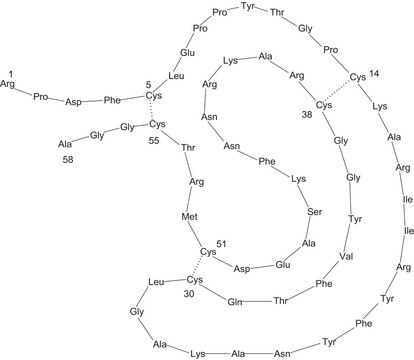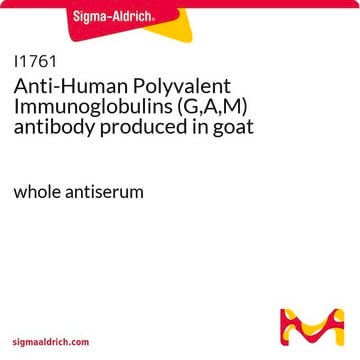A8400
Anti-Human Polyvalent Immunoglobulins (G,A,M)−Peroxidase antibody produced in goat
affinity isolated antibody, buffered aqueous solution
Sign Into View Organizational & Contract Pricing
All Photos(1)
About This Item
Recommended Products
biological source
goat
Quality Level
conjugate
peroxidase conjugate
antibody form
affinity isolated antibody
antibody product type
secondary antibodies
clone
polyclonal
form
buffered aqueous solution
technique(s)
direct ELISA: 1:5,000-1:15,000 using IgG, IgA, IgM
shipped in
dry ice
storage temp.
−20°C
target post-translational modification
unmodified
General description
Human immunoglobulins are glycoproteins that regulate immune responses to infections and allergies. Anti-human polyvalent immunoglobulins can be used for serological analyses in diseased population groups . These antibodies may also be used for studying xenotransplantation models and immunological disorders such as rheumatoid arthritis . Anti-Human Polyvalent Immunoglobulins (G,A,M)-Peroxidase antibody is specific for human IgG, IgA and IgM when tested against human IgA, IgG, IgM, and Bence Jones κ and λ myeloma proteins.
Immunogen
Purified human IgA, IgG, and IgM
Application
Anti-Human Polyvalent Immunoglobulins (G,A,M)-Peroxidase antibody is suitable for use in ELISA and immunoblot.
ELISA was performed to determine serotype-specific antibody avidity indexes for sera and monoclonal antibodies using HRP-conjugated goat anti-human polyvalent IgG with incubation for 2 hours.
Physical form
Solution in 0.01 M phosphate buffered saline, pH 7.4 containing 1% bovine serum albumin with preservative.
Preparation Note
Prepared using the periodate method described by Wilson, M.B., and Nakane, P.K., in Immunofluorescence and Related Staining Techniques, Elsevier/North Holland Biomedical Press, Amsterdam, p215 (1978).
Disclaimer
Unless otherwise stated in our catalog or other company documentation accompanying the product(s), our products are intended for research use only and are not to be used for any other purpose, which includes but is not limited to, unauthorized commercial uses, in vitro diagnostic uses, ex vivo or in vivo therapeutic uses or any type of consumption or application to humans or animals.
Not finding the right product?
Try our Product Selector Tool.
Signal Word
Warning
Hazard Statements
Precautionary Statements
Hazard Classifications
Aquatic Chronic 2 - Eye Irrit. 2 - Skin Irrit. 2 - Skin Sens. 1
Storage Class Code
12 - Non Combustible Liquids
WGK
WGK 3
Flash Point(F)
Not applicable
Flash Point(C)
Not applicable
Personal Protective Equipment
dust mask type N95 (US), Eyeshields, Gloves
Choose from one of the most recent versions:
Already Own This Product?
Find documentation for the products that you have recently purchased in the Document Library.
Ingeborg Kvivik et al.
Innate immunity, 27(4), 286-293 (2021-05-05)
Fatigue is common in all chronic inflammatory and autoimmune diseases. A conceptual model for understanding the biological basis of fatigue describes it as being a part of the sickness behaviour response generated by pro-inflammatory cytokines and other mediators. We hypothesised
J Nessa et al.
Journal of applied microbiology, 90(1), 68-72 (2001-01-13)
To use a commercial ELISA kit and an immunoblot assay to investigate the antibody levels of selected members of the Bangladeshi population to Helicobacter pylori protein antigens. Using immunoblotting, high seroprevalence rates were observed in all age groups, although the
Karl Albert Brokstad et al.
The Journal of infectious diseases, 185(7), 878-884 (2002-03-29)
The immune response in the nasal mucosa to influenza vaccination in 23 patients scheduled for tonsillectomy was studied. A statistically significant increase in influenza virus-specific serum and oral fluid antibodies was observed 7 days after vaccination. The numbers of influenza
H E Baxendale et al.
Infection and immunity, 74(2), 1025-1031 (2006-01-24)
Structure-function correlations of pneumococcal antibodies are important in predicting how changes in the pneumococcus (Pnc)-specific B-cell repertoire will influence humoral immunity against invasive Pnc disease. Using a unique panel of human hybridomas derived from memory B cells after pneumococcal conjugate
S A Pesoa et al.
Autoimmunity, 4(3), 171-179 (1989-01-01)
The distribution of frequencies of HLA-DR alloantigens in HLA-DR4 negative subjects was determined in patients with Rheumatoid arthritis (RA) and normal individuals. An increased incidence of HLA-DR1 alloantigen in DR4 negative RA patients (45.9%) compared with DR4 negative healthy controls
Our team of scientists has experience in all areas of research including Life Science, Material Science, Chemical Synthesis, Chromatography, Analytical and many others.
Contact Technical Service









